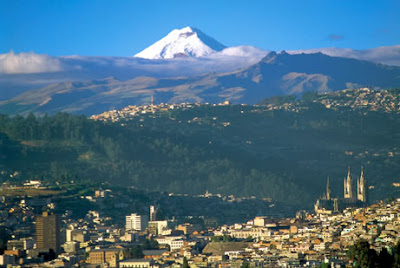Uganda is a beautiful country. What will stay with me will mainly be the joy and laughter of the Ugandans. But my time out there was incredibly intense...
Upon arriving, we were escorted to the V.V.I.P. area of the airport (Very VIP!). We were introduced to our two bodyguards and then whisked to the hotel with full police escort: a bus of 20 interpreters with a motorcade of 2 police cars and 2 police motorbikes, barging all other traffic aside and even going the wrong way down a short bit of motorway in the face of oncoming traffic!! Some of the other interpreters are senior colleagues who have worked for all kinds of Presidents and Prime Ministers...but they said this was the first time they had seen so much police protection for interpreters!
We got to know our bodyguards and they told us they are 'body-cover security' for the President himself! Which means they accompany the President and are willing to take a bullet for him if necessary! They told us how the President sat down with them and said, "look, my interpreters are the most important people in this conference. If there is a problem with the interpreters, the whole event will be a huge embarassment because we have so many governments from Spanish and French speaking countries! You must do everything you can to protect them!
This meant that we were not allowed out to roam the city freely at any point! (But I had already been in Kampala and have a good friend there and so I managed to organise a little tour, during which we stopped off to eat as the locals do on the street. There were goats and chickens roaming around on the street when we arrived. When I got my plate of roast goat, I was told that there was now one less goat wandering around on the street outside!
President Museveni is one of the more jovial dictators in Africa. In the meetings, he was behaving like a caring grandpa who still has the mental wherewithal to pull out little jokes here and there. At one point, he announced that he was giving the floor to the President of Equatorial Guinea, the one and only Teodoro Obiang. And it was my turn to interpret.
By this stage in the event, I had already interpreted a number of Presidents. So my acute nervous breakdown was not due to him being a Head of State. My internal turmoil was actually due to the fact that I knew this man and had had to deal with his government on a previous occasion. And that episode was possibly the worst experience in my life.
I had travelled to Equatorial Guinea for work two years previously, only to be thrown out of the country after taking a selfie in front of the Presidential Palace. At the time, I thought I was just taking a photo of some nice African flowers - I had no idea that Obiang lived behind the massive wall. The commotion that followed meant that I was harassed on the street by seven heavily-armed soldiers, threatened with torture, instructed to apologise in person to the Head of the National Army and then put in lockdown in my hotel for over a week. If you want to know the kind of government I'm talking about, do an online search for "human rights abuses in Equatorial Guinea".
So, you can imagine that I was somewhat nervous when I realised that I would be the official voice of Africa's most notorious dictator, a man who has been in power for over 40 years, having murdered his own uncle in a horrifying manner to become President. (Look up his preferred murder method if you're not squeamish!) And I am now a persona non grata for him. What would happen if I made a mistake interpreting his speech? What if Obiang were to complain about the interpretation? Would I be carted away for that round of torture that his soldiers had so eagerly promised me back in Malabo? Would my face appear in newspapers as 'that interpreter' who mysteriously disappeared after a slight mishap while working?
Luckily, despite my nerves and shakey voice, I managed to remember that little phrase that keeps me going as an interpreter, "all you need to do is to say what he's saying. Just do that and you'll be fine".
It was 8 days packed with meetings and we barely had any time for anything but work. But the hotel was amazing...possibly the best one I've ever stayed in, anywhere. It had a real African feel with symbolism and hints of different parts of Africa in all the decor, food and surroundings. All the staff seemed to parade that very African smile and joy 100% of the time!
The summit was the biggest international event held in Uganda since the Queen and Prince Charles visited for the Commonwealth Summit in 2007. Our event was considered much bigger than the Pope's visit, for example. So, the security was crazy.


